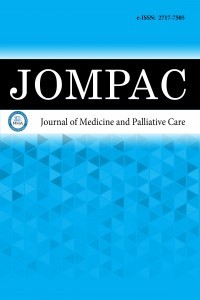Radyoterapi uygulanan meme kanserli hastalarda pandemi etkileri
COVID-19, meme kanseri, onkoloji, pandemi
Pandemic effects in breast cancer patients treated with radiotherapy
COVID-19, breast cancer, oncology, pandemic,
___
- Singhal T. A review of coronavirus disease-2019 (COVID-19). Indian J Pediatr 2020; 87: 281-6.
- Dai M, Liu D, Liu M, et al. Patients with cancer appear more vulnerable to SARS-CoV-2: a multicenter study during the COVID-19 Outbreak. Cancer Discov 2020; 10: 6: 783-91.
- Zhang H, Han H, He T, et.al. Clinical characteristics and outcomes of COVID-19–ınfected cancer patients: a systematic review and meta-analysis, JNCI 2021; 113: 4: 371–80.
- Liang W, Guan W, Chen R, et al. Cancer patients in SARS-CoV-2 infection: a nationwide analysis in China. Lancet Oncol 2020; 21: 335- 7.
- WHO. Draft landscape and tracker of COVID-19 candidate vaccines. Accessed May 21, 2021. https://www.who.int/publications/m/item/draftlandscape-of-covid-19-candidate-vaccines.)
- Ribas A, Sengupta R, Locke T, et al. Priority COVID-19 vaccination for patients with cancer while vaccine supply ıs limited. Cancer Discov 2021; 11: 2:233-6.
- Network. NCC. Recommendations of the NCCN COVID-19 vaccination advisory committee. 2021 [updated Accessed March 24, 2021. Available from: https://www.nccn.org/docs/default-source/covid19/2021_covid19_vaccination_guidance_v3- 0.pdf?sfvrsn=b483da2b_60.)
- https://covid19bilgi.saglik.gov.tr/depo/enfeksiyonkontorlonlemleri/COVID19 Kanser Hastalari Tani Ve Tedavi Merkezlerinde Alinmasi Gereken Enfeksiyon Kontrol Onlemleri.pdf.)
- Achard V, Tsoutsou P, Zilli T. Radiotherapy in the time of the Coronavirus pandemic: when less is better. International Journal of Radiation Oncology Biology Physics 2020; 107: 3.
- Guckenberger M, Belka C, Bezjak A, et al. Practice recommendations for lung cancer radiotherapy during the COVID-19 pandemic: An EsTRO-AsTRO consensus statement. Radiotherapy and Oncology: Journal of the European Society for Therapeutic Radiology and Oncology 2020.
- Centers for Disease Control and Prevention (2020). CDC Activities and Initiatives Supporting the COVID-19 Response and the President’s Plan for Opening America Up Again. Erişim adresi (28.05.2020): https://www.cdc. gov/coronavirus/2019-ncov/downloads/php/CDC-ActivitiesInitiatives-for-COVID-19-Response.pdf .
- Chu DK, Akl EA, Duda S, Solo K, Yaacoub S, Schünemann HJ. Physical distancing, face masks, and eye protection to prevent person-to-person transmission of SARS-CoV-2 and COVID-19: a systematic review and meta-analysis. Lancet 2020; 10242: 1973–87.
- Entrenas Castillo M, Entrenas Costa LM, Vaquero Barrios JM, et al. “Effect of calcifediol treatment and best available therapy versus best available therapy on intensive care unit admission and mortality among patients hospitalized for COVID-19: A pilot randomized clinical study”. J Steroid Biochem Mol Biol 2020; 203:105751
- Pereira M, Dantas Damascena A, Galvao Azevedo LM, de Almeida Oliveira T, da Mota Santana J. Vitamin D deficiency aggravates COVID-19: systematic review and meta-analysis. Crit Rev Food Sci Nutr 2020; 1- 9.
- Shakoor H, Feehan J, Al Dhaheri AS, et al. Immune-boosting role of vitamins D, C, E, zinc, selenium and omega-3 fatty acids: Could they help against COVID-19? Maturitas 2021; 143:1- 9.
- Charoenngam N, Shirvani A, Holick MF. Vitamin D and Its Potential Benefit for the COVID-19 Pandemic. Endocr Pract 2021; 27: 5: 484–93
- Hemila H. Vitamin C and Infections. Nutrients 2017; 9: 4: 339
- Dos Santos LMJ. Can vitamin B12 be an adjuvant to COVID‐19 treatment?. GSC Biol Pharm Sci 2020; 11: 3: 1‐5.
- Herrmann W, Obeid R. Causes and early diagnosis of vitamin B12 deficiency. Dtsch Arztebl Int 2008;105: 40: 680-5.
- Maggini S, Pierre A, Calder PC. Immune Function and Micronutrient Requirements Change over the Life Course. Nutrients 2018; 10: 10: 1531.
- Gombart AF, Pierre A, Maggini S. A Review of Micronutrients and the Immune System-Working in Harmony to Reduce the Risk of Infection. Nutrients 2020; 12: 1: 236.
- Giordano SH. A review of the diagnosis and management of male breast cancer. Oncologist 2005; 10: 7: 471-9. CrossRef
- Uğurluer G, İlhan M, Edirne T, Şahin HA, Turan N. Erkek Meme Kanserleri. Van Tıp Derg 2009; 16: 1: 1-5.
- Eroğlu A, Ersöz Ş. Erkek Meme Kanseri. Yeni Tıp Dergisi 2010; 27: 202-7.
- Yu J, Ouyang W, Chua ML, ve Xie C. (2020). SARSCoV-2 transmission in cancer patients of a tertiary hospital in Wuhan. JAMA Oncol 2020; 6: 7:1108-10.
- World Health Organization (2020). Report of the WHO-China Joint Mission on Coronavirus Disease 2019 (COVID-19). Erişim adresi (23.04.2020): https://www.who.int/docs/ default-source/coronaviruse/who-china-joint-mission-oncovid-19-final-report.pdf
- Bese NS, Hendry J, Jeremic B. Effects of prolongation of overall treatment time due to unplanned interruptions during radiotherapy of different tumorsites and practical methods for compensation. Int J Radiat Oncol Biol Phys 2007; 68: 654-61.
- Our World in Data. Coronavirus (COVID-19) Vaccinations https://ourworldindata.org/covidvaccinations (Accessed on August 14, 2021).
- Chu DK, Akl EA, Duda S, Solo K, Yaacoub S, Schünemann HJ. Physical distancing, face masks, and eye protection to prevent person-to-person transmission of SARS-CoV-2 and COVID-19: a systematic review and meta-analysis. Lancet 2020;10242:1973–87.
- Başlangıç: 2020
- Yayıncı: MediHealth Academy Yayıncılık
Diyabetik maküla ödeminde arka vitreus dekolmanının rolü
Ayşe TÜFEKÇİ BALIKÇI, Nurten UNLU, Sunay DUMAN
Kronik pelvik ağrılı hastalarda laparoskopi sonuçlarının değerlendirilmesi
Asena AYAR MADENLİ, Halime ÇALI ÖZTÜRK
Nadir görülen nutcracker sendromunun yirmi yıllık analizi
Burak DEMİRCİ, Çilem ÇALTILI, Mehmet Oktay ALKAN, İsa BAŞPINAR, Burak AKIN, Abuzer COŞKUN
Radyoterapi uygulanan meme kanserli hastalarda pandemi etkileri
Beyhan CEYLANER BIÇAKÇI, Hüseyin TEPETAM, Duygu GEDİK, İrem YÜKSEL, Melek ÇOLAKOĞLU, Sule KARABULUT GUL
C-reaktif protein albumin oranı canlıdan böbrek naklinde ilk yıl mortaliteyi öngörmektedir
Özgür MERHAMETSİZ, Abdülkadir ÇAT
Mehmet BÜYÜKŞİRECİ, Ayşe Gülşen DOĞAN, Dilek EKER BÜYÜKŞİRECİ, Aynure ÖZTEKİN
Diş hekimliğinde esansiyel yağların kullanımı
Çağla YANKI, Meltem HENDEK, Ebru OLGUN
Aysun KARSLI, Sinan Oğuzhan ÖZSAN, Ertan COMERTPAY, Ahmet Faruk BAŞKÜRKÇÜ, Oğuz EROĞLU, Turgut DENİZ
Pediatrik palyatif bakımda verilen hizmet kalitesini belirleyen faktörler
